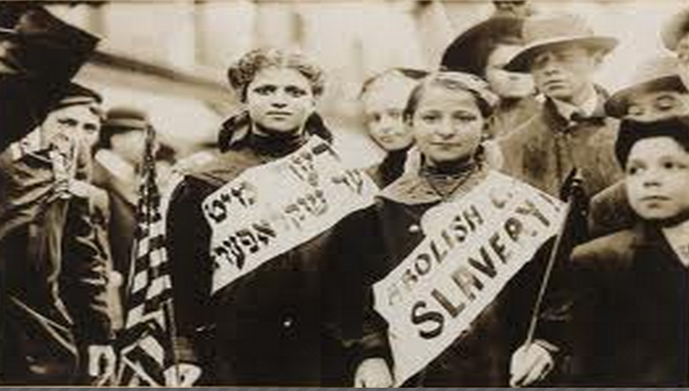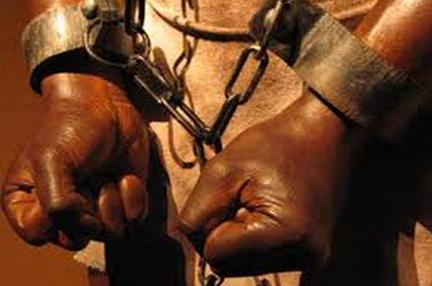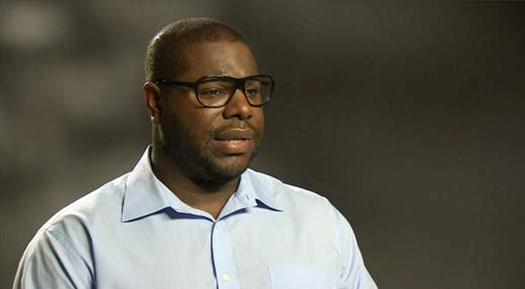Slavery in the News
The Modern Slavery Bill: does the British government really care?

If we are really serious about abolishing slavery in the west today, Rahila Gupta argues that we have to abolish immigration controls so that people can take action against their abusers without fearing deportation.
At the Conservative party conference in 2013, Theresa May, the Home Secretary, announced that the government will be introducing an anti-slavery bill in this parliamentary session and specifically mentioned the Luton case, where homeless men were abducted by an Irish traveller family and made to work long hours for little or no pay, as an example of modern day slavery. The issue received further press attention when news of three women, imprisoned and enslaved for 30 years in South London, surfaced in November; police and commentators expressed their shock that slavery could be ‘hidden in plain sight’ in modern day Britain. However, that case turned out to be atypical of modern slavery in Britain as the women belonged to an absurd Maoist cult which expected the imminent liberation of the Borough of Lambeth by the Chinese Red Army.
My own extensive research has revealed that, whilst slavery is all around us, the Luton case is also atypical because the victims of slavery are rarely British nationals. Although homelessness, alcohol or drug dependency, mental health issues and poverty, as in the Luton case, can make people vulnerable to exploitation, or the stigma attached to prostitution can enforce compliance with the most horrific abuse, the vast majority of people in these situations are immigrants without the right papers or those whose passports are held by unscrupulous employers, pimps, traffickers or abusive husbands. Without recognition of this key fact, any new legislation drawn up to deal with this issue will simply clutter the statute book without serving any useful function.
So what does the Bill propose? The two main proposals are a life sentence for previously convicted traffickers and the creation of a new post of an anti-slavery commissioner to ensure implementation of the law. Currently, there are not that many previously convicted traffickers. Under legislation such as the Sexual Offences Act 2003 and the Asylum and Immigration Act 2004 there have been about 8 to 25 convictions in any one year from 2005 to 2011, the majority of which dealt with sex trafficking. Even Theresa May was forced to concede that the convictions rates were ‘shockingly low’. So the proposal to increase sentencing for serious repeat offenders does not mean much yet – at least, until we have more convictions. Under the Gangmasters (Licensing) Act 2004, only one illegal gangmaster has been given a prison sentence, for exploiting Lithuanian chicken workers, during the eight years that the Gangmaster Licensing Authority (GLA) has been in operation. Many gangmasters are simply given a ‘warning notice.’ GLA was under-resourced from the beginning but its effectiveness has been further compromised by budget cuts of 17 per cent from 2011-2014.
We may hope that the appointment of an anti-slavery commissioner could rectify this sorry state of affairs. However, many campaigners believe that the way this post will be set up, appointed by and directly under the control of the Home Secretary with limited resources will not give the commissioner the wide-ranging powers necessary to ensure the effective implementation of current legislation - let alone the Bill if it is passed into law
While the Bill proposes to bring together and consolidate all the different pieces of anti-trafficking legislation, it does nothing to enhance protection of the ‘victims’ of trafficking or improve the way in which the system is currently operating. A report published by the Anti-Trafficking Monitoring Group, Hidden in Plain Sight, highlights the many failings of the system: from a failure to identify victims through a myopic definition of trafficking to gross discrimination against those who have been trafficked from outside of Britain or the EU to treating victims as criminals because they have been forced into illegal activity by their traffickers. It used to be common practice for police to raid a brothel or a factory accompanied by immigration officers whose primary interest was to ferret out illegal immigrants. There are some reported improvements in this area but any victims of trafficking that the enforcement bodies come across, who were not part of a ‘rescue’ operation, are still likely to be considered immigration offenders. Almost all the ‘failings’ can be attributed to the government’s attempt to keep immigration figures low. The greater the number of people identified as trafficked, the greater the government’s responsibilities towards them under the European Convention against Trafficking, to which the government is a signatory. It obliges the government to provide counselling, medical care, legal support, safe accommodation, a 45-day period of ‘reflection’ and a one-year residence permit to those who co-operate with the police in actions against thetraffickers.
Whilst anti-trafficking organisations, like ECPAT and Anti-Slavery International, are doing sterling work, chipping away at the laws, policies and practices that discriminate against victims of trafficking, their success is bound to be limited by the government’s anti-immigration hysteria. This central contradiction at the heart of government policy becomes as clear as crystal when you look at the bills going through Parliament now: the Immigration Bill, which aims to create a 'hostile environment' for irregular migrants by turning landlords, doctors, bankers into border control guard-dogs, sits alongside the Modern Day Slavery Bill which aims to help a target group which overlaps with irregular migrants.
The other unacknowledged contradiction in government policy is the tension between providing employers with a ‘flexible workforce’ ie an ever-ready pool of cheap, exploitable labour to depress wages and keep inflation low at home whilst publicly declaiming their support for British jobs for British workers in a bid to wrest ground back from UKIP. The workers for the Lithuanian gangmaster, mentioned above, were collecting free range eggs sold through major retailers including Tesco, Marks and Spencer and Sainsbury's - all members of the Ethical Trading Initiative. Within this framework, the ineffectiveness of GLA should be seen not as a weakness but part of a deliberate strategy. A blog on the Migrant Rights Network website states, ‘that farmer unions have effectively lobbied some sympathetic Conservative ministers and backbenchers to try and offload the GLA on to the Department for Business, Innovation and Skills (BIS), who have on many occasions expressed great keenness to “abolish” the authority and have in the past “consistently argued for the abolition of the GLA”’. This kind of pressure, no doubt, contributes to reduced funding for GLA.
I have focused on trafficking because the new slavery bill focuses on trafficking but this can lead to a misguided elision of the two issues. Trafficking is not the only way in which migrants find themselves enslaved but it is the only route through which the government makes a half-decent stab at doing something about slavery. Those migrants, including asylum seekers, who are escaping war, torture, environmental degradation and/or poverty and have paid people-smuggling gangs to bring them into this country, get no protection even though many of them end up in slavery. They are seen as complicit in immigration offences despite the fact that many of them are fleeing the consequences of British foreign policy or British presence in their countries. Millions of people in other countries have been forced to make way for large dams, oil pipelines and agricultural plantations in which UK companies are involved, often as a condition of UK aid money, such as the Ilisu Dam in Turkey, and the Baku-Ceyhan oil pipeline. Similarly women who have come in on a spousal visa but have become overstayers or otherwise unwittingly broken immigration laws because their passports are withheld by violent husbands are also enslaved.
If we are really serious about abolishing slavery in the west today, we have to abolish immigration controls so that people feel able to take their complaints of violence and abuse to the police without fearing deportation.
Please find the link to the original article
Slavery 'Should Be Made Essential Reading'

Britain's involvement in the slave trade is on the history national curriculum, but many claim the subject is being skimmed over.
The teaching of Britain's involvement in the slave trade is "patchy" and not enough time is devoted to it despite the subject being on the national curriculum, it has been claimed.
The Department for Education has admitted to Sky News that it has no idea how many schools are actually teaching the subject because it is not compulsory.
Britain played a central role in the trade of slaves until its abolition more than 180 years ago, with cities like Liverpool, Bristol and London key trading ports.
Under the last Labour government the then prime minister Tony Blair controversially expressed "sorrow" for the country's involvement in the slave trade but stopped short of apologising for it.
The release of several high-profile films has brought the issue to the forefront once again.
The British director of Bafta-nominated 12 Years A Slave, Steve McQueen, believes the subject should be compulsory in schools.
The film tells the story of Solomon Northup, a New Yorker kidnapped and forced into slavery.
"The movie is really a way into this subject. It gets people talking about it and sparks debate. The Northup memoirs, upon which this film is based, should be essential reading for all schoolchildren, in my view," he told Sky News.
For well over 300 years, Britain played a leading role in forcing Africans onto slave ships for transportation across the Atlantic Ocean.
It is thought that British ships may have carried as many as 3.5 million Africans to the Americas.
But it is unclear now many children learn about the slave trade and how influential Britain was in it.
Dr Richard Benjamin, from the International Slavery Museum in Liverpool, says teachers can use their resources to teach the subject.
"We work with teachers to help teach this part of the curriculum. But the teaching of the subject is a bit patchy and I don't think that three hours at the museum is enough. Some children have no idea that Britain was such a big player in the slave trade until they're in their mid-20s. We should not be getting to our mid-20s to find that out."
A Department for Education spokesperson said: "Unfortunately we do not hold information about how many schools are actively teaching the slave trade. The slave trade is covered in the new national curriculum, which will be taught in schools from this September. Pupils will learn about the British Empire from 1745-1901 in much greater depth as part of the new more rigorous history curriculum. Schools are also free to use other opportunities within the curriculum to teach about the slave trade and as part of Black History Month."
Please find the link to the original article
Will Steve McQueen be first black film-maker to win best director Oscar?

Gong for 12 Years a Slave nominee would follow year of real progress, but history shows such breakthroughs are illusive
Steve McQueen may not be the favourite to win the Oscar for best director when the statuettes are handed out on 2 March, but if he does it will represent a historic breakthrough for black film-makers: none has ever been honoured in this category and only two others have even been nominated – John Singleton in 1992 for Boyz n the Hood and Lee Daniels in 2009 for Precious.
The claims of Alfonso Cuarón, director of space-walk thriller notwithstanding, we may witness a moment equal to that of Kathryn Bigelow's, when in 2009 she became the first woman to win the best director Oscar for The Hurt Locker (defeating Daniels as she did so).
McQueen's prominence arrives on the back of a year that saw real progress for black film-makers, particularly in the US.
Fruitvale Station, a low-budget film about the real-life killing of a black teenager by transit police in Oakland, California,took the big prize at the 2013 Sundance film festival. Sober stories – such as McQueen's 12 Years a Slave, the Jackie Robinson biopic 42 andThe Butler – investigating the African American role in US history have done well with critics (though The Butler, despite early buzz, was shut out of the Oscars). Commercial success has greeted other less artistically distinguished films, such as The Best Man Holiday and A Madea Christmas – the latter written, directed and starring one-man powerhouse Tyler Perry.
Although it is difficult to quantify progress, there does appear to be an upswing in attention for more diversity onscreen. Darnell Hunt, director of the UCLA Bunche Centre for African American Studies, told al-Jazeera: "People have been talking about the issue of the lack of diversity in Hollywood … I think that certainly in terms of visibility and notoriety, this year has been quite remarkable."
However, watershed periods for African American film-makers have happened before. The blaxploitation fad of the 70s created opportunities for directors such as Melvin van Peebles (Sweet Sweetback's Baadasssss Song and Shaft).The early 90s saw the rise of "new jack" cinema, such as Boyz n the Hood, Mario van Peebles's New Jack City, as well as Spike Lee's Malcolm X. In the 2000s, Keenen Ivory Wayans scored a string of successes at the box office with the Scary Movie horror-parody series. Will Smith became a bona fide global film star in the mid-90s – though, significantly, he has never had an African American director.
Breakthroughs have often proved illusory. In 2011, African American directors were reported to comprise only 4% of the Directors Guild of America's 15,000 film-makers. The highest-grossing black director of all time is Perry, with a lifetime box-office gross of $726m (£444m) in the US. In second place is the perhaps less well-known figure of Tim Story, who can thank two Fantastic Four pictures for his $490m. This compares to$4.1bn lifetime gross for Steven Spielberg, the all time number one, and $2bn for Robert Zemeckis, who is in second. The position of black female directors is considerably worse, with Angela Robinson, director of Herbie: Fully Loaded occupying the highest-grossing position. Despite the likes of Julie Dash (Daughters of the Dust) and British director Amma Asante (Belle), critical acclaim has also been hard to find.
The situation of black directors is in stark contrast to that of actors; in some ways it is analogous to that of black football players and club managers. Hattie McDaniel was the first black actor to win an Oscar (best supporting actress in 1939 for Gone with the Wind) – but in many ways that was an aberration, as roles were largely confined to victim/servant stereotypes until the 1960s. Pinky, a 1949 race drama about a light-skinned black woman passing for white, was another exception, garnering a best supporting nomination for Ethel Waters.
Sidney Poitier blazed a trail in the 60s for Lilies of the Field, winning best actor for his role as a handyman helping a group of nuns build a chapel in the desert. However, after a string of nominations, the second African American actor to take that honour was Denzel Washington in 2001 forTraining Day – in the same year that Halle Berry became the first black woman to win best actress, for Monster's Ball.
In recent years, there would appear to be little obvious impediment to black actors' success, with the likes of Viola Davis, Quvenzhané Wallis, Morgan Freeman and Forest Whitaker among those being nominated – and in some cases winning – Oscars in the past 10 years.
But if there is still a barrier to directors, in other behind the scenes roles the situation is even worse. Only one black cinematographer, Remi Adefarasin, has been nominated (for Elizabeth), and one editor, Hugh A Robertson (Midnight Cowboy). There has been one black winner of a screenplay Oscar (Geoffrey Fletcher for Precious), though 12 Years a Slave's John Ridley is a good bet to join him. No black producer has ever won best picture.
Predictably perhaps, black artists have been most successful in the best original song category, with Isaac Hayes, Stevie Wonder and Irene Cara among the five winners.
So all eyes will be on McQueen to see if he can see off his rivals on 2 March – but history may have to wait.
Amma Asante
I went to school in the 1980s with Naomi Campbell. She became one of the first black women to appear on the cover of Vogue. For that issue, sales fell substantially. In 2008, Italian Vogue had an all-black issue. They had to reprint several times. The film industry is going the same way.
We're still experiencing a turning point where film-makers of colour are able to show financiers that movies with black leads can sell. As a writer/director, when you're making a movie with a black lead you feel the weight of it; that your movie does well so you're able to do it again.
I sat down with my mother over Christmas and we watched Mandela, 12 Years a Slave and The Butler all at once. My mother was thirsty for it.
It was important for my film, Belle, to tap into the Jane Austen world that audiences are familiar with. It's challenging to sell a movie with a black lead unless you recruit A-list celebrities, such as Samuel L Jackson or Will Smith. Belle is inspired by a portrait of Dido Belle and her cousin … the first in the UK where a person of colour is treated as an equal. Dido Belle was biracial and her cousin white. Both were raised as aristocrats at Kenwood House.
Please click on the link to find the original article
